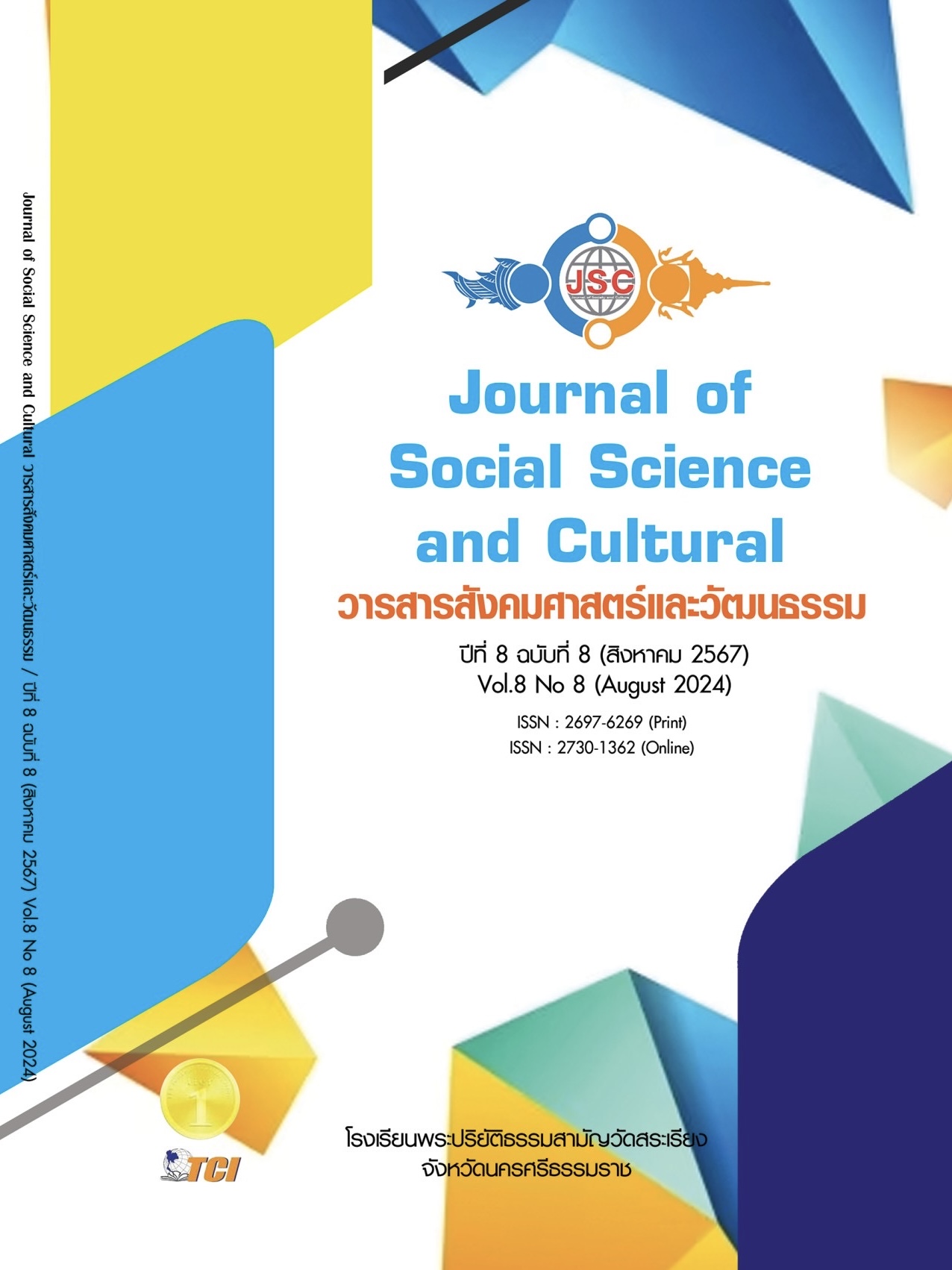BUILDING COMMUNICATIVE COMPETENCE OF THAI FARMERS
Main Article Content
Abstract
Strengthening farmers: Thai farmers must be able to produce agricultural products with higher value. It is essential to use digital technology to help create management efficiency to maximize returns, be strong in dealing with natural disasters or changes, increase production efficiency in terms of both quantity and quality so that Thai agricultural products meet international standards, which helps farmers to open new markets both domestically and internationally, increase capabilities with technology in terms of production, management or trade, and manage resources in a balanced and sustainable manner. The agricultural sector is a production sector that is important to Thailand's economic system. Therefore, Thai farmers' communication competence is very important because it is a mechanism to drive groups of knowledge, skills, and characteristics in receiving and sending messages. This article aims to find ways to build Thai farmers' communication competence and finds that 1) Thai farmers face various challenges, including climate problems, market access, and government agricultural policies. Effective communication can help farmers access necessary information. 2) Target groups of communication: People are individuals with different needs and interests. Therefore, the ability to analyze information, assess situations, and think creatively to solve complex problems of farmers is the goal of communication. 3) Communication channels: Using social media, virtual community characteristics: Farmers must understand financial risk distribution, access to and use of digital technology, and be aware of the impact on the environment.
Article Details
References
กรมส่งเสริมการเกษตร. (2565). Young Smart Farmer อนาคตและทิศทางภาคเกษตรไทย. กรุงเทพมหานคร: สำนักงานพระพุทธศาสนาแห่งชาต.
กระทรวงศึกษาธิการ. (2566). กรอบหลักสูตรสมรรรถนะการสื่อสาร. เรียกใช้เมื่อ 1 เมษายน 2567 จาก https://cbethailand.com
กุลภา กุลดิลก. (2566). ทุนมนุษย์กับรายได้จากการเกษตร. เรียกใช้เมื่อ 1 เมษายน 2567 จาก https://gsbooks.gs.kku.ac.th/55/cdgrc13/files/hmp1.pdf
คณะนิเทศศาสตร์ มหาวิทยาลัยแม่โจ้. (2566). สื่อเปลี่ยนคนต้องปรับ. เรียกใช้เมื่อ 1 เมษายน 2567 จาก https://coordinate.mju.ac.th/goverment
ณรงค์วิทย์ แสนทอง. (2547). มารู้จัก Competency กันเถอะ. กรุงเทพมหานคร: เอชอาร์เซ็นเตอร์.
ลัทธพร รัตนวรารักษณ์ และคณะ. (2562). Digital technology กับการยกระดับคุณภาพชีวิตเกษตรกรไทย. ใน รายงานการวิจัย. สถาบันวิจัยเศรษฐกิจป๋วย อึ๊งภากรณ์.
วศิน อุ่ยเต็กเค่ง. (2558). การศึกษากลยุทธ์การสื่อสารทางการตลาดออนไลน์ของธุรกิจภาพยนตร์ออนไลน์ รูปแบบสตรีมมิ่งในประเทศไทย. ใน รายงานการวิจัย. มหาวิทยาลัยกรุงเทพ.
วิษณุ อรรถวานิช และคณะ. (2562). ภูมิทัศน์ภาคเกษตรไทยจะพลิกโฉมอย่างไรสู่การพัฒนาที่ยั่งยืน. ใน รายงานการวิจัย. ธนาคารแห่งประเทศไทย.
สำนักงานคณะกรรมการข้าราชการพลเรือน. (2566). Digital Transformationเพื่อการจัดการนิเวศเศรษฐกิจเกษตร 4.0 Plus. กรุงเทพมหานคร: สำนักงานคณะกรรมการข้าราชการพลเรือน.
สำนักงานปลัดกระทรวงเกษตรและสหกรณ์. (2565). แผนแม่บทภายใต้ยุทธศาสตร์ชาติ ประเด็นการเกษตร. เรียกใช้เมื่อ 1 เมษายน 2567 จาก http://nscr.nesdc.go.th
สำนักงานสถิติแห่งชาติ. (2566). สถิติผู้มีงานทำ. เรียกใช้เมื่อ 1 เมษายน 2567 จาก http://statbbi.nso.go.th/staticreport/page/sector/th/02.aspx
Akasing, M. et al. (1996). Selection of Suitable Areas for Fish Farming in Rice Fields by using the Geographic Information System. Bangkok: Department of Agriculture.
Division of Technology Policy for Agriculture and Sustainable Agriculture. (2014). 123 alternative farming professionals. Retrieved Apil 15, 2024, from https://esc.doae.go.th/wp-content/uploads/2018/08/123job.pdf
Drucker, P. F. (1999). Management Challenges for the 21st Century. New York: Harper Business.
McClelland. (1973). Business Drive and National Achievement. New York: McGraw–Hill Book, Co.ltd.
Michiel, R. P. et al. (2006). Purchasing and Supply Management with 50 Supply Chain Cases. (13thed). Singapore: McGraw-Hill.
Scott, B. P. (1997). Evaluating the Impact of Training. Virginia: American Society for Training and Development.
Terence, A. S. (2007). Integrated Marketing Communications in Advertising and Promotion. New York: Thomson Higher Education.
Sufficiency Economy Steering Committee Office of the National Economic and Social Development Board. (2006). What is Sufficiency Economy? Bangkok: Sufficiency Economy Group, Office of the National Economic and Social Development Board.


